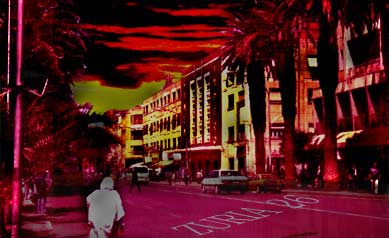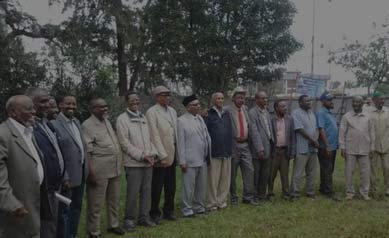“Eritrea Has Lost 25-30 Soldiers” In Djibouti
News about the escalating tension between Eritrea and Djibouti has caught Eritreans, including strong supporters of the ruling regime, off-guard. Here’s what we know so far:
- On January 2008, on two occasions, President Isaias Afwerki paid a visit to the port city of Asab and had a meeting with Djibouti officials at a military club of the Eritrean Defense Forces (EDF.) In his meeting, Isaias informed the Djibouti officials that the EDF would be digging trenches approaching the common border.
- The first problem: definition of common border. It is not delineated or demarcated in any way. The various interpretations of where the Eritrea-Ethiopia border is led to a confusion in 1996, which was quickly averted thanks to the involvement of France.
- The second problem: the January agreement between Isaias Afwerki and the Djibouti officials was not committed to paper or formalized.
- The digging by EDF and the construction of the trenches involved the use of heavy machinery by Warsay-Yeka’alo. There was no attempt made to be sensitive to the whereabouts of the border: military logic dictated that the trenches maximize strategic positioning.
- President Isaias Afwerki personally ordered the EDF to hold on to a strategic hill whose location was, at best, questionable. Djibouti officials said the hill is well within Djibouti—and this is what led to the clash.
- Beginning in April, Djibouti officials claimed that Eritrean forces had become entrenched in its territory since January and that they were amassing armaments and troops. The Eritrean government turned a deaf ear.
- The proximity between Eritrean and Djibouti soldiers was eventually going to result in a clash. The New York Times dramatized this by publicizing a picture of the hill and the position of the two sides.
FACTORS & COINCIDENCES
- French helicopters landed twice on Djibouti territory close to the border of Eritrea. The EDF became suspicious that this was, somehow, an Ethiopian provocation. In fact when Djibouti forces asked EDF why they were digging trenches, the EDF replied, “It is against any Ethiopian aggressors which you can’t defend.”
- On April 30, 2008, Geeska Africa, a Somali website quoting Eritrean defense ministry, reported that Eritrea and Djibouti would soon sign a regional cooperation agreement on security.
- There is a speculation that the US which, like France, has a presence in Djibouti is planning to construct a permanent base in Djibouti, near the Eritrean border.
- For over two years, Eritrea and Ethiopia were supporting two sides of the Somalia civil war: the Transitional Federal Government (TFG) and the Union of Islamic Courts (UIC). Although the Ethiopia-supported TFG is nominally in power, the momentum was shifting to the UIC, and particularly its expanded Asmara-based coalition, the Alliance for Reliberation of Somalia (ARS.) Djibouti’s decision to host a conference to reconcile the TFG with the ARS was seen by Isaias Afwerki as Djibouti coming to the rescue of TFG and Ethiopia. Isaias Afwerki is said to be very bitter about the decision of a faction of ARS to sign a peace treaty with the TFG.
- There is a major commercial development initiative going on in Djibouti. Meanwhile, the government of Eritrea has been trying without success, for nearly a decade, to make Massawa and Asab, tax-free free-trade commercial zones. Djibouti is benefiting greatly from the Eritrea-Ethiopia border standoff, whereas Eritrea is suffering. Failing to bring finality to the Eritrea-Ethiopia border conflict on his terms, Isaias may want to do the next thing: to deny Djibouti its current competitive advantage or at least halt its advances.
- An armed Ethiopian opposition group which was stationed in Western Eritrea was instructed to relocate to Southeastern Eritrea earlier this year.
THE CLASH OF JUNE 10 AND JUNE 11
- The conflict between Eritrea and Djibouti lasted two days: June 10 and June 11.
- It involved heavy armaments but there were no assaults or pitched battles.
- Given the prolonged, tense situation in a confined area, anything could have triggered the battle. The most plausible explanation is that Eritrean soldiers, who have a history of bravery but are now, thanks to the Eritrean regime’s brutally compulsory and endless service, always looking for an opportunity to escape, surrendered to Djibouti officials.
- Furious Eritrean officers demanded that they be returned, and this is what resulted in the exchange of fire.
- Djibouti sources have reported that 9 Djibouti soldiers were killed, with dozens wounded.
- Eritrean officials always keep their casualties a secret—until the mission is complete or the war is concluded. But according to our military sources, Eritrea has lost 25-30 soldiers and that over 100 have sustained injuries. (Please note that this part of the report is based on two sources only.)
- Eritrean soldiers in the hands of Djibouti are estimated to be about 100. Some are defectors, and some are “prisoners of war.” Who is who won’t be known until ICRC gets involved, a process which may take months or years.
- The Eritrean media has a total blackout on the conflict with Djibouti. Until Isaias Afwerki gives a “special interview” blaming it all on the US and Ethiopia, people have been tuning in to foreign media outlets.



Awate Forum